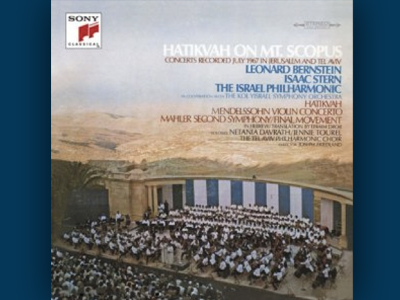
July 9, 1967
On July 9, 1967, a packed audience filled the amphitheater on Mount Scopus to celebrate the end of the June 1967 War and to mark the cultural unification of Jerusalem. Among those in attendance were Prime Minister Levi Eshkol, President Zalman Shazar, former Prime Minister David Ben-Gurion and many soldiers who had been wounded in the just-ended war. Leonard Bernstein headlined the concert as the conductor of the Israel Philharmonic Orchestra.
Bernstein was joined by mezzo-soprano Jennie Tourel. Shortly before the Nazi invasion, Tourel had fled from Paris where she was the star of the Opéra Comique. An avowed Zionist and frequent collaborator with Bernstein, Tourel was one of the first internationally known artists to visit the State of Israel in 1949. She continued to visit Israel frequently throughout her life.
Bernstein chose to have the orchestra perform Mahler’s Second Symphony because, as he said, “its theme is resurgence, and it contains so many Jewish undertones.” Addressing the audience, Bernstein recalled the events of 1948:
The idea of resurrection at that time was momentous; after all, this land had just been reborn. But still the ancient cycle of threat, destruction and re-birth goes on; and it is all mirrored in Mahler’s music – above all, the expression of simple faith – of belief that good must triumph. En b’rerah! – there is no alternative.
CBS records produced an album from the concert titled “Hatikvah on Mount Scopus,” which became a worldwide best seller. Proceeds from the concert were directed to a fund that promoted cultural, physical and spiritual activities among Jewish and Arab youth in Jerusalem.
